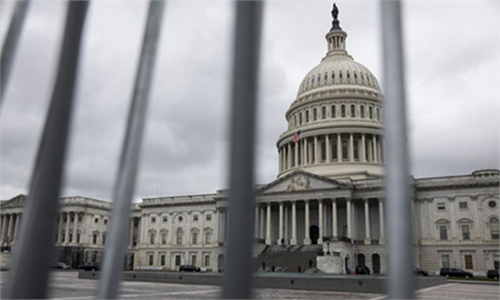Chinese firms in sectors subject to negative list face limits in overseas IPOs
Move under negative list to close loopholes, protect national security: experts

Wall Street Photo: AFP
Overseas listings by Chinese companies in sectors that are off-limits to foreign investment will become difficult or increasingly less favored following new rules for offshore flotations that were unveiled alongside the latest negative list for market access, analysts said on Tuesday.
The release of the annually revised negative list for foreign investment on Monday soon made the headlines as the country shortened the list for the fifth year in a row.
Noteworthy was an attempt to close a regulatory loophole, with an addition to the negative list's explanatory notes that requires domestic firms in sectors designated as off-limits for foreign investment to file for review and approval by regulators before they list shares overseas.
The new regulation, coming just days after the country released draft rules for domestic firms' overseas IPOs, is seen as tightening the scrutiny of overseas listings through variable interest entities (VIEs), a structure that has long been relied on by domestic internet firms for overseas share offerings, according to market watchers.
VIEs have been employed to bypass restrictions on foreign ownership in sectors deemed sensitive, and the new rules are likely to complicate such overseas listings, Hong Hao, research head and chief strategist at Bank of Communications International, told the Global Times on Tuesday, citing data handling among other concerns over such listings.
Oversea investors are barred from participation in corporate operations and management, per the new regulation, which also set caps on overseas investors' shareholding ratios, the National Development and Reform Commission (NDRC) said in a statement on its website on Monday.
Stake holdings by individual overseas investors and their affiliates shouldn't exceed 10 percent of the total number of company shares, while the combined holdings of all overseas investors and their affiliates must be less than 30 percent, read the statement.
As for companies in those sectors falling under the negative list and trading their shares both at home and abroad, overseas investors' holdings of both the domestic and overseas listings will be combined when complying with shareholding limits.
Among the sectors designated off-limits in the updated annual list are rare-earth mining, telecoms, news organizations and compulsory tutoring institutions.
The new guidance targets overseas listings by firms operating domestically, plugging the overseas funding loophole for domestic businesses, Wu Jinduo, head of fixed income at the research institute of Great Wall Securities, told the Global Times on Tuesday.
Companies that list their shares overseas via VIEs have been shown to be "shell companies" in overseas markets, Wu said, noting that the new regulation is indicative of the country's support for businesses to opt for both domestic and overseas listings in a law-abiding manner.
Speculative companies that take advantage of overseas listings for speculative gains won't be supported, she continued.
Domestic firms with VIE structures that meet the compliance requirements could still float overseas after filing with the relevant authorities, on the premise that they abide by Chinese laws and regulations, according to the draft rules for overseas IPOs announced late on Friday by the securities regulator.
The new rules ban overseas listings considered to pose a national security threat, yet defuse woes over entirely barring VIE-based overseas IPOs.
This clarifies the regulatory mindset governing overseas listings in the wake of ride-hailing platform Didi's contentious flotation on the New York Stock Exchange at the end of June, only to decide to delist about five months later, amid a cybersecurity probe.
Platform firms implicating national information, financial and data security might hit roadblocks when it comes to overseas IPOs, Wu commented.
Hong said that such listings will become difficult, and it's increasingly unnecessary for domestic firms to eye foreign markets for share offerings, citing valuations and liquidity as the main factors funneling listing plans into home markets.
China's regulatory shift is likely to accelerate the homecoming trend of US-traded Chinese firms that also face US regulatory toughening. Failure to share auditing working papers could subject firms to delisting from US bourses in 2024, analysts said.
Zhihu, a Quora lookalike question-and-answer forum in Chinese, has plans to list its shares in Hong Kong in the near future or submit its IPO documents in June 2022, Chinese news outlet Jiemian reported over the weekend. Zhihu said it hasn't heard of the news, media reported.
Zhihu debuted on the New York Stock Exchange in late March, and its shares were down 42.95 percent as of Monday's close.
Earlier this month, the Beijing cyberspace regulator, under the guidance of the Cyberspace Administration of China, summoned Zhihu for publishing illegal information and demanded "immediate rectifications" based on the country's cybersecurity law.



